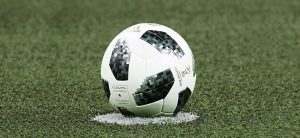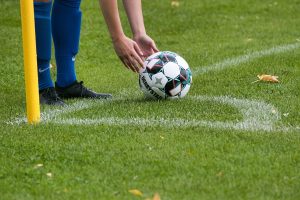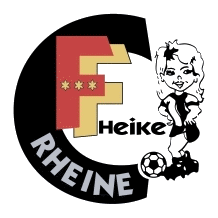 What remains are the fans. The FFC Heike Rheine held its last general meeting in September 2016. On September 30th, the curtain fell forever. The club was dissolved. It was even possible to dissolve the club debt-free. But that doesn’t mean the club is forgotten.
What remains are the fans. The FFC Heike Rheine held its last general meeting in September 2016. On September 30th, the curtain fell forever. The club was dissolved. It was even possible to dissolve the club debt-free. But that doesn’t mean the club is forgotten.
Chairman Alfred Werner thanked all the volunteers at his last general meeting. This fan page is intended to commemorate the work of the many helpers and, above all, the achievements and successes of the players. The FFC Heike Rheine was the women’s football club Heike Rheine e. V.
The club was founded in 1998 with the club colors red and black as a spin-off of the women’s department of FC Eintracht Rheine. The club was the first independent women’s football club in Germany.
How it all began and the great successes

Women’s football in Rheine has its roots in VfB Rheine and was only played locally until 1986. Alfred Werner was the most important person in the founding of the women’s football club and was partly responsible for its great successes. He saw his main task, in addition to his work as a full-time editor at the Rheiner Anzeiger, as managing the club and coaching the women’s football teams.
His first success was promotion to the Verbandsliga in 1988. Just one year later, the team was promoted to the Regionalliga West, where they immediately finished second. Only TSV Siegen was better. The team was thus qualified for the newly founded Bundesliga. In 1992 and 1993, the teams achieved third place in the northern group and played in the semi-finals of the DFB-Polak.
In 1994, VfB Rheine merged with SG Eintracht Rheine. The club was then called FC Eintracht Rheine. The team had finished fourth in the northern group of the Bundesliga four times in a row. In 1997, they automatically qualified for the Bundesliga, which from then on only had a single division with twelve teams. The team also reached the cup final in 1997, but lost 3-1 to Grün-Weiß-Brauweiler.
March 10, 1998 was a memorable day. The women’s soccer department split off and became an independent women’s soccer club called FFC Heike Rheine. The name Heike was chosen in honor of the then coach Heike Kinder.
Unfortunately, the team was relegated at the end of the season. Grün-Weiß Brauweiler Rheine won 1-0 and the team had to play in the regional league again.
But just one year later, the team was back and playing in the top division. The season was rather mixed and at the end the team should have been relegated again. But FFC Flaesheim-Hillen announced its voluntary withdrawal and Sportfreunde Siegen had its license revoked, so that no team was relegated at the end of the season.
In 2003, the team was back in the top ranks and finished fourth in the women’s soccer league. The women also won the DFB Women’s Indoor Cup. The next year, the team improved by one place and finished the season in third place. Kerstin Garefrekes was the top scorer. At the end of the season, the top scorer moved to 1. FFC Frankfurt. Other strong players left the club, so that the top performers dropped out and the team only reached the lower ranks of the table.
In 2007, the second relegation finally occurred. Nicole Werner, who had played for the club for many years and trained the team as player-coach, announced her retirement. Ralf Spanier took her place as coach.
More and more players left the relegated team. Players from the second team had to fill up the squad so that a team fit for play could take to the field. In the 2007/2008 season, the team finished last in the league table. From the 2008/2009 season, FFC Heike Rheine only played in the third division, again in the Regionalliga West.
Only the better goal difference prevented the team from being relegated even further in the 2011/2012 season. In 2015, they were relegated to the Westfalenliga and in 2016 they were dissolved and deleted from the club register.
The successes at a glance

- 1997 Team reaches the final of the DFB Supercup
- 1997 Team reaches the DFB Cup final
- 2000 team promoted to the women’s Bundesliga
- 2003 Team wins the DFB Indoor Cup
- 2004 Team reaches 3rd place in the Women’s Bundesliga
- 2004 Team reaches the DFB Cup semi-finals
Personalities and big names
In most sports clubs, there are usually several key people who play an important role in the success of the team. These can be players, coaches, support staff, administrators or fans.
Key players in a football club can include talented players who consistently perform at a high level and contribute to the team’s success. These players can become fan favourites who are remembered for years to come.
- Kerstin Garefrekes

Kerstin Garefrekes began her sporting career in 1986 at Grün-Weiß Steinbeck. She moved to Rheine in 1998, where she played in the first season. In 1999 she became top scorer in the 1st Women’s Bundesliga. In 2001 she made her debut in the senior national team. She scored her first international goal in 2002. With the women’s national team she became world champion in 2003 and 2007 and European champion in 2005 and 2009. In 2009 she won bronze at the Olympic Games in Athens in 2004 and in Beijing in 2008.
In 2004, she scored 26 goals in the Bundesliga, which made her the top scorer again. That year, she left FFC Heike Rheine and moved to 1. FFC Frankfurt.
Kerstin Garefrekes ended her football career in May 2016. She can look back on 355 Bundesliga matches and 130 appearances for the German national team.
- Loes Geurts
The Dutch national goalkeeper’s career began at VV Res, where she played as a youth. She joined FFC Heike Rheine in 2005, where she played in the Bundesliga seasons. In 2007, after the team was relegated, she played in the Netherlands again, where she won the Dutch championship with AZ Alkmaar in 2008 and 2009. She played her first international match in 2006 against Australia.
- Kerstin Stegemann
Kerstin Stegemann’s career began at Germania Hauenhorst. In 1993 she played for VfB Rheine, where she made her Bundesliga debut at the age of 15. She was already a leading player at a very young age. She made her debut for the national team just two years later. In 1996 she took part in the Olympic Games. In 1997 she reached the DFB Cup final with Rheine and became European champion that same summer. In 1998 she moved to Duisburg. In 2000 she became German champion with this club and won the indoor cup. In 2000 she also won the bronze medal with the national team at the Olympic Games in Sydney. In 2001 she returned to Rheine.
Despite many good offers, she stayed in Rheine until 2007. Further successes included first place at the 2007 World Championships, European Champion in 2001, 2005 and 2009, Vice Military Champion in 2007 and 2011 and finally Military World Champion in 2008. She played 191 games for the national football team.
- Ursula Landwehr
Ursula Landwehr from Oldenburg joined VfB Rheine early on, where she played as a midfielder in the Verbandsliga and, after promotion, in the Regionalliga West from the 1989/1990 season. In 1991, she and her team finished in second place, which meant promotion to the Bundesliga.
Ursula Landwehr played six international matches for the German national team, where she made her debut in September 1988. In the match against Poland in Aue in 1991, she scored her only goal for the national team with the winning goal.
Why the club was called Heike
A revolutionary name, as many thought at the time. The club chairman, however, saw nothing special in it. After all, according to FFC boss Alfred Werner, “there are many Victorias, Fortunas and Herthas. So why not a Heike as a feminine reference?”
The original idea was to include Kerstin in the club name to immortalize the outstanding Kerstin Stegemann. But as the player left the club shortly afterwards, Heike Kinder was immortalized in the name instead. She was the coach of the Bundesliga club at the time.
Great plans
 The club’s finances were secured. For the next three seasons after its foundation, thanks to some generous german online casinos 268,000 marks were available for each season. The club was well staffed with 150 female footballers. There were two women’s teams and a girls’ team, as well as a group of amateur footballers over 30. The supervisory board included prominent figures from local politics and business, such as the Lord Mayor of Rheine and the head of the Sparkasse bank.
The club’s finances were secured. For the next three seasons after its foundation, thanks to some generous german online casinos 268,000 marks were available for each season. The club was well staffed with 150 female footballers. There were two women’s teams and a girls’ team, as well as a group of amateur footballers over 30. The supervisory board included prominent figures from local politics and business, such as the Lord Mayor of Rheine and the head of the Sparkasse bank.
The club chairman had a vision not only of stable finances, but also of revolutionary club structures. The plan was to have a partnership with top teams from all over Europe and a sponsorship for an Eastern European club. A hardware store was available as a sponsor for the girls’ soccer school and a chip chain was to be the main sponsor of a regular international indoor tournament.
What led to the dissolution of FFC Heike?
For Alfred Werner, it was a painful decision to close the club. But it was also a logical consequence. In the end, the financial support from sponsors was missing, without which top-class football simply cannot exist. Another problem was a tough competitor in the immediate vicinity.
Alfred Werner sees a large part of the blame as lying with himself. He says he did not do enough to find new players or to get fresh money from new sponsors. There was no successor or anyone to support him in the club.
In the summer of 2015, almost the entire first team left FFC Heike Rheine. This essentially sealed the club’s fate. Many of the players went to direct rivals Germania Hauenhorst. After the team was relegated from the Regional League, Alfred Werner no longer had any women who could play in the Westphalia League. There was only a B girls’ team that played in the district league.
Special moments with FFC Heike Rheine
One of the club’s best times was the time immediately after its foundation. The club hosted three international matches within about three years.
A particularly beautiful moment was the day the team brought the DFB Indoor Cup to Rheine. That was in 2003, when the team also finished fourth in the Bundesliga.
One of the fond memories is that several national players emerged from the FFC Heike Rheine club, such as Kerstin Stegemann, Kerstin Garefrekes and Ursula Landwehr.
In addition to these on-field successes, FFC Heike Rheine has also been recognised for its involvement in the local community. The club has been involved in numerous charity events, including food drives and charity matches, and has helped to raise awareness and funds for a variety of causes.
Finally, FFC Heike Rheine had a strong tradition of promoting young talent. The club had a youth academy where young players were trained and had the opportunity to develop their skills and reach their full potential. This helped the club to be a major player in women’s football for many years.
In summary, FFC Heike Rheine has a rich history full of special moments that have made the club what it was. From the successes on the field to the contributions to the community and the commitment to developing young talent, FFC Heike Rheine is a club that embodied the spirit of women’s football.
